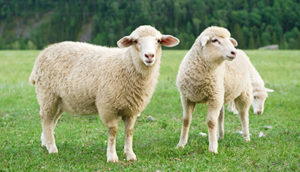Read the latest information on
Foot-and-mouth disease
 The Australian sheep and wool industries are set to receive greater support in implementing proactive biosecurity measures, through the appointment of a specialist extension resource at Animal Health Australia (AHA), based in South Australia.
The Australian sheep and wool industries are set to receive greater support in implementing proactive biosecurity measures, through the appointment of a specialist extension resource at Animal Health Australia (AHA), based in South Australia.
Establishing the role, which has been filled by Dr Emily Buddle, is an important early step in delivering against the National Sheep Industry Biosecurity Strategy 2019-2024 (NSIBS), which was developed by Sheep Producers Australia (SPA) and WoolProducers Australia (WPA).
The NSIBS forms a commitment by the two national industry bodies to ensuring the sheep industry remains stable and secure into the future, by encouraging sheepmeat and wool growers to take ownership of their own on-farm biosecurity measures and recognise the important role they play.
To assist producers in implementing or improving their biosecurity plan, AHA has engaged Dr Buddle to work with producer groups and individuals across South Australia.
Dr Buddle has an extensive range of experience on the ground in both sheepmeat and wool enterprises, as well as an impressive academic background covering a broad range of topics including agricultural science, community understandings of science and agriculture, and how social media is used to communicate about the livestock industry.
While Dr Buddle will be based in South Australia and commencing the roll-out of extension resources for producers in that state, AHA hopes to expand the biosecurity team with resources in other states in the near future.
“The NSIBS, by definition, is a national strategy which emphasises the need for a consistent approach to biosecurity policy, planning and implementation across Australia,” said AHA’s Executive Manager Biosecurity and Product Integrity, Dr Simon Humphrys.
“We look forward to working with SPA and WPA to see the NSIBS delivering for sheepmeat and wool producers nationwide.”
Dr Buddle will be working closely with Livestock SA, who welcomed the proactive moves taken by SPA and WPA in creating and implementing the NSIBS, and who are eager to be part of the rollout of the program in South Australia.
“Biosecurity is everybody’s business and the NSIBS provides a great framework for a coordinated approach in South Australia,” said Livestock SA CEO Andrew Curtis.
“We are pleased to see the leadership shown by SPA and WPA in driving continuous improvement in biosecurity practices and fostering a culture of accountability throughout the industry and the supply chain.”
Find out more about biosecurity for Sheep owners on the Sheep page of the Farm Biosecurity website.
This story was first published by Animal Health Australia.